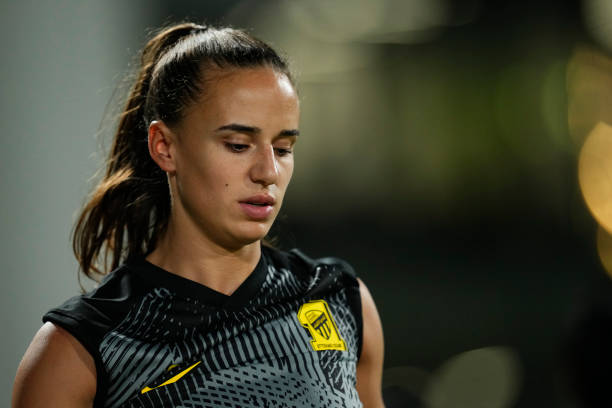Ashleigh Plumptre admits her move to Saudi Arabia’s Women’s Premier League (SWPL) came with challenges, regrets, and new opportunities. In 2023, the Nigeria international left childhood club Leicester City to join Al-Ittihad, becoming the first WSL player to move to the Saudi league. While excited by the prospect of professional growth, Plumptre acknowledges that her decision hurt some fans, particularly in the LGBT community, and that Saudi women’s football still has work to do both on and off the pitch.
The 27-year-old had initially been hesitant about the move. With her Leicester contract ending, she sought a new challenge where she could feel valued as a footballer and a person. “I was shocked. My initial reaction was ‘no,’ but I wanted to give them a chance,” Plumptre told BBC Sport. After a visit to Jeddah and discussions with Al-Ittihad’s management, she decided to take the leap, attracted by the project rather than financial incentives.
The SWPL, launched in 2022, is fully professional with 24 teams across three leagues. Clubs can sign up to six foreign players, and international stars like Plumptre are expected to elevate the competition. While the men’s Saudi Pro League has garnered attention for attracting global stars, Plumptre says the women’s league is still developing, with lower attendance and a noticeable skill gap between international and homegrown players.
Her move, however, was controversial. Same-sex relations are illegal in Saudi Arabia, and Plumptre’s decision prompted negative reactions from LGBT fans in women’s football. “I deeply hurt people because they felt I was representing something which made them not feel valued,” she said. Despite this, she emphasized that the move did not mean she condoned any illegal practices, adding that she understands the criticism.
Plumptre’s life in Saudi Arabia differs from common Western perceptions. She lives in a gated compound, offering a secure, suburban-style environment with amenities such as gyms, pools, and restaurants. “I feel happier and safer here as a woman than I did in the UK,” she explained, citing the relaxed atmosphere in daily life as a positive aspect. While recognizing that some restrictions still exist under the country’s guardianship system, Plumptre feels personal freedom and safety have improved in her new surroundings.
Training and facilities at Al-Ittihad are also developing. Initially sharing gyms with volleyball and basketball teams, the women’s squad now trains in a dedicated space with access to ice baths, medical clinics, and upgraded pitches. Plumptre trains in the evenings to avoid extreme daytime temperatures, which also frees up her daytime schedule—a setup she compares to her formative years at Leicester’s academy.
Despite progress, attendances remain low. Most SWPL teams play in stadiums under 15,000 capacity, with sparse crowds. Plumptre notes that community initiatives, such as school programs and family-focused outreach, are crucial for developing a fanbase, and Saudi clubs are beginning to implement such programs. Matches are broadcast locally and via DAZN in Europe, helping raise awareness.
Plumptre also cautions against rushing Saudi Arabia into hosting major tournaments. She believes the focus should remain on developing players and the league sustainably. “In the near future I would say ‘no’ [to a Women’s World Cup bid] because everything takes time,” she said. “It’s about taking measurable and decisive steps to ensure long-term success.”
In reflecting on her journey, Plumptre acknowledges the complex balance between personal ambition, cultural challenges, and the broader development of women’s football. While her move to Saudi Arabia came with scrutiny and criticism, it also represents an opportunity to shape a nascent league and inspire change for female athletes in the region.



